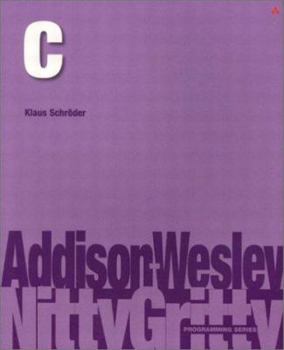Nitty Gritty C
This title provides the facts needed to get up and running quickly, it can also be used as an ongoing reference guide for all the fundamentals. It contains practical tips and tricks and a reference... This description may be from another edition of this product.
Format:Paperback
Language:English
ISBN:0201758784
ISBN13:9780201758788
Release Date:January 2001
Publisher:Addison-Wesley Professional
Length:400 Pages
Weight:1.60 lbs.
Dimensions:0.8" x 7.5" x 9.2"
Customer Reviews
2 ratings
Surprisingly good
Published by Thriftbooks.com User , 17 years ago
This is one of the few C++ books that I'm aware of that does a good job of comprehensively covering almost all the features of C++ in a small number of pages ( I wouldn't recommend it for someone with *no* prior programming experience -- one of those 1000+ page tomes by Herbert Schildt or similar is probably better for that. (It's also worthwhile to consider such a book that's specific to the C++ compiler you're intending to use -- Jeske's book has all of 3 pages on how you actually go about compiling a program, and assumes a command-line *NIX environment.) It's true that it doesn't provide a lot of reference material on, e.g., the standard C++ libraries. In my mind that's what on-line help is for -- all the details of those printf() format specifiers, the more obscure String class methods, etc. This information in printed form is often a waste anyway, I think -- I have one of those "pocket programmer's reference" books that's 400 pages long, of which perhaps the 100 pages relating to the language itself and the most commonly used library features are the ones I actually care about. Jeske's book takes those ~100 useful pages and expound upon them, ending up at 300 pages: If I'm going on a trip, I'd much rather have his book and the on-line help with me than just my 400 page pocket reference! I haven't found the lack of a decent index a problem, but it is odd that the index gets all of 3 pages when the (nicely detailed) table of contents gets 4. The "Start Up!", "Take That!" and "Go Ahead!" sections are not something Jeske came up with, but instead are common to all of the Addison Wesley "NittyGritty" programming series books.
Very good initial exposure to the language
Published by Thriftbooks.com User , 22 years ago
In my opinion, C is an easy language to learn, but one of the hardest to program well in. The flexibility of the language and the relative lack of rigid compiler rules make it easy to make mistakes that are subtle and difficult to find. In general, it takes an extensive amount of time before one can be considered proficient in the language. Most people learn to code a certain way and keep those habits, good and bad, throughout their programming careers. For these reasons, your initial study of any language is critical. This book is designed to be a first exposure to the language and it covers all the standard features of C that should be presented. That of course makes it no different from the many other books on C that have been published over the past few decades, although there is a bit more coverage in this one than in others. The primary point of distinction between books in C is the tone and format, areas where this book is certainly above average. There is none of the compact, obfuscated code that some programmers seem addicted to, as the author goes to great lengths to point out the dangers of that approach. No specific style is emphasized, a point that I found refreshing, as personally, I am very tired of hearing passionate arguments over insignificant points of style. I was also impressed by the greater than normal treatment of the actions of the C preprocessor. This is a topic that is often neglected, which is unfortunate, as many of the more subtle bugs that I have dealt with were due to "unexpected" behavior based on the actions of the preprocessor. The examples are small, which is generally good, and there are many of them, with exercises at the end of the chapters. Unfortunately, there are no larger examples that can demonstrate how the solutions to more complex problems are put together. Nearly all modern programming projects are measured in millions of lines of code, so putting together a few projects of a couple hundred can at least give the hint of how software is really built. In general, the book is a solid introduction to the C language and if you are in need of such a book, this one will serve you well.






